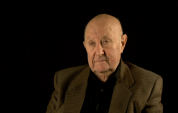8:56 | Reading from his memoir, Sun Rays At Midnight, Norbert Friedman tells the story of an unsung hero of the Holocaust. On a four day journey, packed into cattle cars with no food and water, this man somehow found a way to exemplify all that is noble and decent about the human race.
Keywords : Norbert Friedman Jew Jewish Polish Sun Rays At Midnight Germany concentration camp Holocaust food water Flossenburg

Norbert Friedman was born into a traditional Jewish Family in Krakow, Poland. It was a large and loving family which was disrupted when the German Army invaded. When the bombs began to fall, there was a family meeting. What to do with our young men?
Norbert Friedman was aware of what was happening to Jews in Germany. As conditions worsened in the Krakow ghetto, he and his family decided to flee to smaller and smaller towns. Eventually, even the tiny village where they were hiding was encircled by German troops and all the Jews rounded up. The men were told if they volunteered for a labor camp, their families would be spared, but this was a lie.
When he got to the labor camp, Norbert Friedman found a little community inside, with people from all over. His father and two uncles were with him, not yet aware that all their relatives had already been subjected to the Final Solution. After some bad work assignments, he was fortunate to get a skilled job in a testing lab.
After two years in a forced labor camp in his native Poland, Norbert Friedman was sent to a series of different camps, most in Germany. On the transport to the second one, the Jewish prisoners were crammed into cattle cars and given no food or water on the four day journey. At the camp, they were forced to strip and went into showers.
Dachau was just one of many forced labor camps for Norbert Friedman. One of the first built, it was run internally by German political prisoners. At the next camp, it was Gypsies. Along with his father and two uncles, he was fortunate to be classified as skilled labor, which was in high demand at German aircraft plants.
The Augsburg concentration camp was different. For the first time at any camp, there were Russians. It was there that Jewish prisoner Norbert Friedman witnessed the first act of rebellion he had seen when three condemned Russians stunned their executioners with their bravery.
Because of fierce Allied bombing, an Autobahn tunnel had been converted to an aircraft factory where fuselages for the Me-262 were made. Norbert Friedman was a Jewish prisoner who was forced to labor at the plant. It was there that he received a savage beating for not responding to an air raid.
Norbert Friedman was watching a group of arriving prisoners at the Leonburg concentration camp when he spotted an old friend from Krakow. They stuck together from there through to the last camp, when they were suddenly put on the road in a death march. His friend, Oscar, was sick and wasn't going to make it. They came up with a desperate plan to save him.
Reading from his memoir, Sun Rays At Midnight, Norbert Friedman describes the day of liberation when he saw American tanks rumble into the little German village where they were hiding in a barn. They were Polish Jews who had labored for three years in the vast network of Nazi forced labor camps.
Just before he was liberated, Norbert Friedman witnessed a last evil act by one of his German captors. Once it was all over, many newly freed prisoners suffered by overeating the food given them by GI's, but he avoided that fate. As he and his father contemplated their next move, a group of Americans pulled off the road to eat. When he approached, he saw that they were black and he did not know what to think.
In a passage from his memoir, Sun Rays At Midnight, Norbert Friedman describes the joy he felt when he found his friend Oscar, whom he had last seen playing dead in a ditch on an SS death march. He joined Oscar working for an American unit as an interpreter and he began to admire and become attracted to the American way of life.
What a change. Norbert Friedman went from slave laborer to translator for the Americans and in his uniform, he could exercise some authority over his former tormentors. He was so enamored of his liberators, he decided he must become an American.
During his time in Nazi forced labor camps, Norbert Friedman came to the conclusion that there is no limit to evil inclinations in men. He gives an example of this and then relates the story of Pastor Dietrich Bonhoeffer, a dissident German Lutheran theologian, who was in the concentration camp with him.
Most accounts of the Holocaust deal with the atrocities, but to survivor Norbert Friedman, there are two little known aspects of it that people should know about. One is the rare courage that enabled some individuals to overcome the overwhelming despair and the other is the role of women during the entire conflict.
Holocaust survivor Norbert Friedman speaks about the unbelievable tragedy of knowing that almost all of your family was sent to gas chambers. It left a huge void in his existence. He was living in New York when 9/11 struck and it triggered old nightmares.
The survivors of Nazi concentration camps are a tight knit group. Norbert Friedman describes the close bond with those he knew in the camps. He writes of this in his memoir, Sun Rays At Midnight. It is based on his vivid memories, including a macabre dance around a burning German fighter plane.